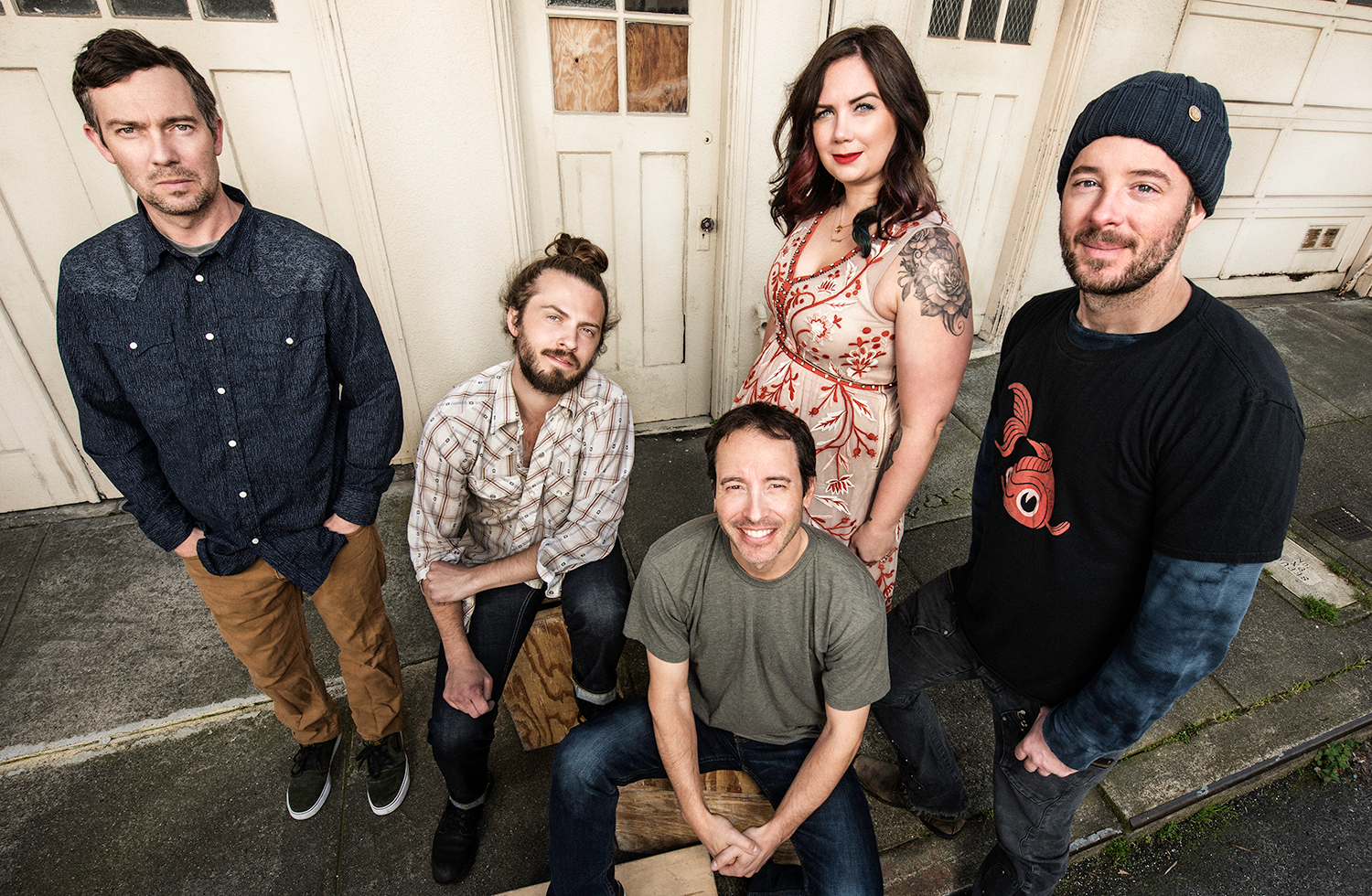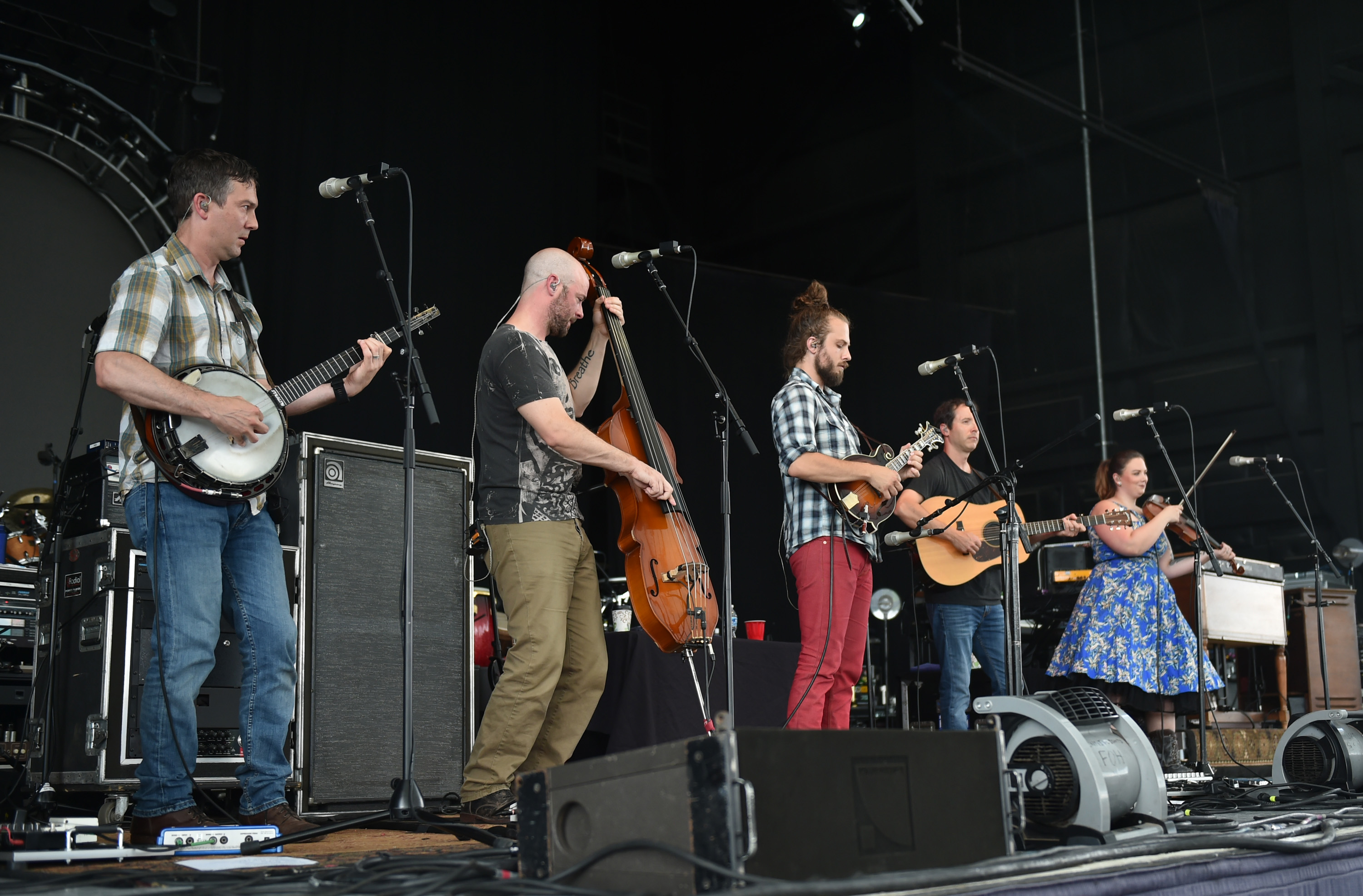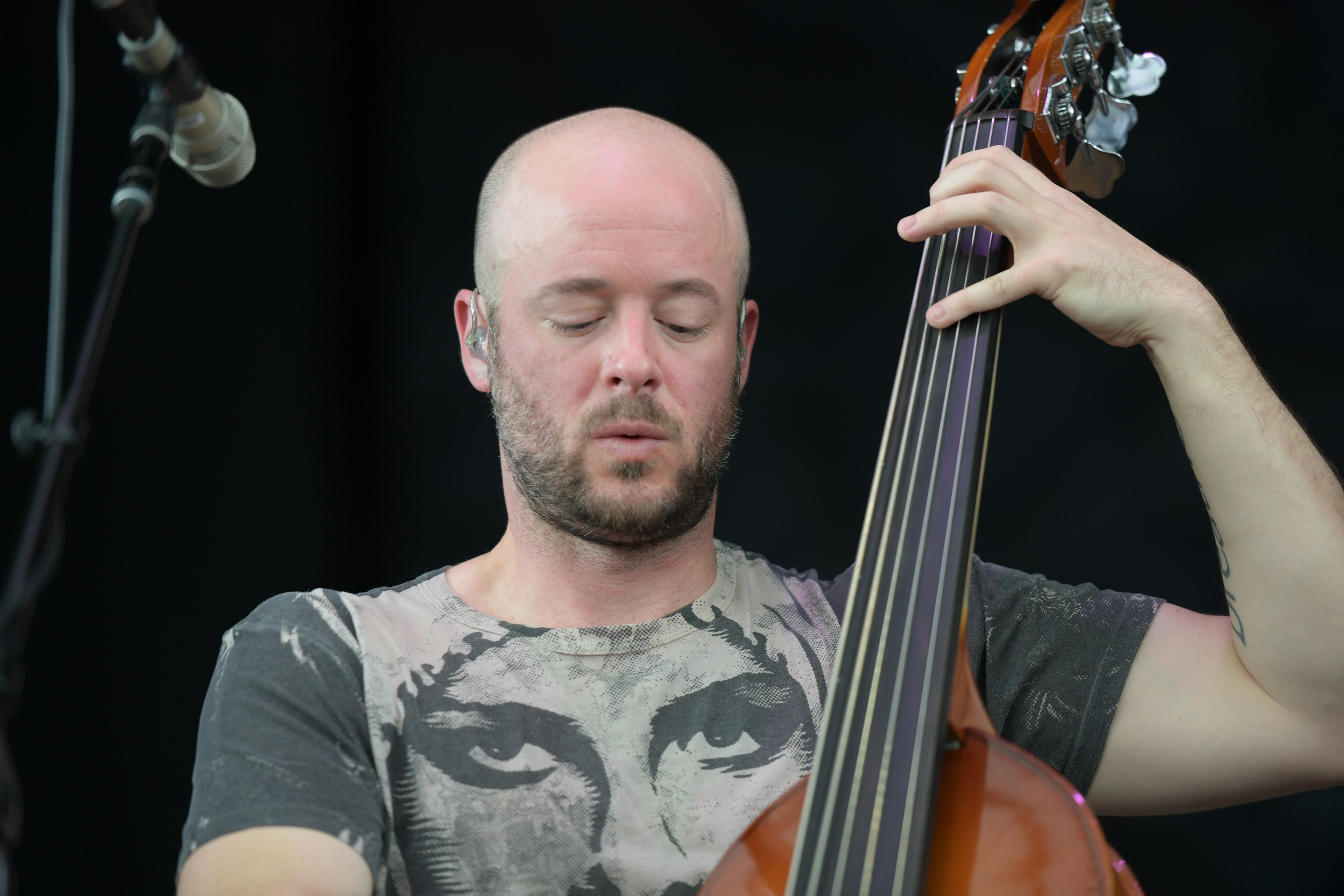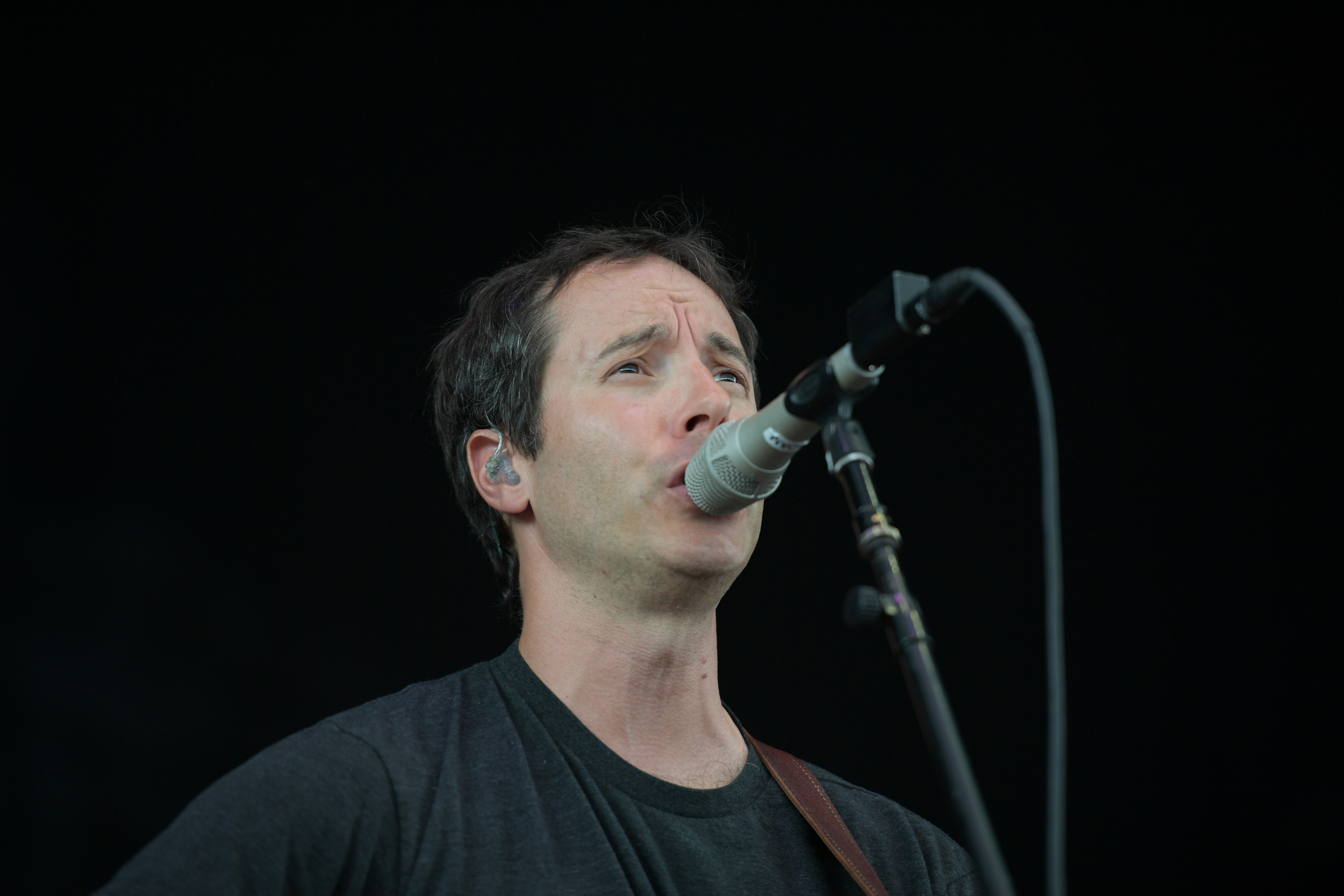Track By Track: Yonder Mountain String Band’s _Love. Ain’t Love_

“As I think back ,” Yonder Mountain String Band bassist Ben Kaufmann reflects shortly before the release of Love. Ain’t Love, the group’s first album in two years and second with their reconfigured lineup, “We made a record called The Show and then, in the blink of an eye, six years had passed and Yonder hadn’t made another studio record. That sort of had become normal in a way.”
In 2014, mandolin player Jeff Austin parted ways with Yonder after 16 years in the Colorado string outfit. Kaufmann, guitarist Adam Aijala and banjoist Dave Johnston quickly decided to continue on with two new players, recruiting fiddler Allie Kral and mandolinist Jake Joliff.
“Once we had the lineup change it was very important to make a studio record [2015’s Black Sheep] to lay the foundation of what the band sounds like now and for people to hear the different players,” Kaufmann continues. “It was very important to present that calling card, but I discovered just how enjoyable the studio experience was in a way that it hadn’t been—this creative space. We all realized that we wanted to do it again as soon as possible. Fitting in the studio time was kind of a scheduling trick, but it was something that was really important to us. So we went back in and knocked out a track here, a track there, overdubbed and kept writing some of the songs—they were just ideas when we first tracked them. They didn’t have lyrics.
“The experience was so enjoyable and creative in a way that was different than the razor-edge, improvisational, live-show dynamic. When we started to finish the songs and see how they all came together, Adam also had this idea of wanting to create ways to bridge the songs together— transitions and sonic bridges to create a connective singular experience. That was exciting to see and to become inspired by and get creative with.” 
ALISON
DAVE: I got the idea for the song from an old medieval poem. I’ve always liked the name Alison, and I thought it was very lyrical name that lends itself to being sung. I typically don’t like to say things that are immediately digestible or consumable. I like to write in the direction of mystery. I’ve always really enjoyed English poets and the way that old folk hymns or old folk rhymes have very alluring and captivating melodies, while the words sometimes can be very fun as well. W. H. Auden has a book of medieval poems and children’s rhymes. I like him because he writes really tight lines. Richard Hugo made a good point about Auden, which was that a lot of people can make music conform to truth but very few people can make truth conform to music. Auden was really getting lightning in a bottle with almost every word. I can’t help but read him and feel real excited, so I’m always going back to dig in and see what he has to say, even if it’s a children’s poem.
FALL OUTTA LINE
ADAM: Way back when we were doing the first sessions, I knew that “Fall Outta Line” would go into “Bad Taste.” “Fall Outta Line” is an old instrumental—more of a lick almost—that I came up with probably 10 years ago. I’d play it when we messed around backstage, or sometimes I’d tease it on stage when I was doing something alone. But it wasn’t until I showed it to Jake that it really turned into something because that guy’s a lunatic. He brought it a different life. It was originally just supposed to be a tweener and it’s still pretty short, but it turned into a song.
BAD TASTE
DAVE: Adam had a voice memo laying around. We were sitting in the basement listening to memos and, when I heard it, I was like, “I feel pretty confident that I can get words for that.” He sent it to me and I listened to it while walking around the house, cleaning, doing something to distract myself. The lyrics just fell out of the sky when I was doing the dishes. It was an interesting concept where you have the punishee and the punisher— where did they come from and why are they there?
TAKE A CHANCE ON ME
BEN: Four years ago, I was just practicing and playing the bass, and my son was about a year old. It was just him and me in the house. I don’t know how many times he’d seen the big bass being played and for whatever reason I had this funky bass line come into my mind. I was playing it and, the next thing I knew, he crawled over to the bass and stood up and was leaning against it and had his body pressed to the front of the bass and I was just playing this slow, funky line and trying to figure it out. I will always remember that moment as the genesis of that song. It was a wonderful shared moment with myself and my boy.
As far as the music, it was really just the first funky part—it didn’t develop much more than that until we had a real collaborative writing session. I brought it to the band, and I remember sitting down with Adam and Jake in the bus at one point and playing it. Jake had a cool idea for how to transition it into a B part. My initial instinct was to keep it instrumental, like a Meters tune but Adam kept saying, “No man, there’s a lyric possibility here and a call-and-response thing.” He really had it, even though, at first, I didn’t understand where he was going with it. We slowly pieced it all together and he started writing lyrics and throwing things out. It was important to him that it be a call and response with a lot of harmony, but simple lyrically.
Eventually it came together and we recorded what I guess I can call verses. And then, I had this idea to put in this gang chorus response to the middle of each verse with this dirty mic recording style—very raw, no effects on it, a really analog-sounding response in the background with the harmony vocals. By the end of it, I felt, “This is exactly what I hoped this silly bassline would have turned into all the way back then.” 
CHASING MY TAIL
DAVE: A lot of times, if you want a big reaction, you play fast and loud. Yonder does alright with rowdy people; we enjoy having rowdy shows. However, there is also a certain kind of satisfaction in playing something that’s slow and lends itself more to your imaginative precision. A song like “Take a Chance on Me” does that for me, where there’s lots of space, there’s lots of opportunities to develop different musical ideas because you have time to engage it. “Chasing My Tail” is another one of those.
I had been listening to a lot of Tom Petty and was using some of his songs as roadmaps. The first line of “American Girl” is an introduction to the American girl, so I was like, “Well, let’s have the first line of my song talk about where I am,” and I just so happened to be in an airport security line. I decided that I was going to develop things in terms of “Where am I, what am I doing?” Most of the lyrics arose from that and I thought it needed more of a groovy, almost mid-tempo rock-androll feeling behind it. Once all those things got put into place, it was pretty easy to develop musically.
USED TO IT
BEN: A little over five years ago, I started spending a lot more time on the piano for songwriting, for creative experimentation and just personal enjoyment. If I’m at home and I feel like I want to be musical, I sit down at the piano. I’m not reaching first for the upright bass. I’ll try to sing a Frank Sinatra song, try to figure out how to play a Billy Joel or Steely Dan song. A lot of times I will just sit there and try to make something up which is how I stumbled into the chord progression and melody for “Used to It.” I got really attached to it in a way that was almost counterproductive because you can write yourself into a bit of a hole or a rut, so it took a long time to get the song finished. I knew how I wanted it to go with the building of tension and something that felt grand, but I couldn’t figure out what I wanted to say for the song.
Lyrics come last for me. You only get a few chances to write new songs and I try to make them worth a damn. I moved to California from Colorado when my wife and I were going to have our kid. I miss Colorado and I can still remember when I first moved there in ‘94 or ‘95, seeing the mountains as I drove from the airport in Denver into Boulder—all of the sudden, there were mountains that stretched as far as the eye can see. Years later, I realized, “I have absolutely forgotten to look up and pay attention to the mountains. I have absolutely forgotten to be humbled by how huge and awesome they are. I go about my work day or whatever it is that I’ve got going on, running errands or thinking about whatever bullshit I’ve got bothering me, and I have forgotten these unbelievable mountains in front of me.” So I was thinking about this and the idea that people can get used to anything. And then I went, “I think I know what I want to talk about in the song.”
EAT IN GO DEAF (EAT OUT GO BROKE)
DAVE: This is an instrumental that Jake developed and he brought a lot of it to the table fully formed. It’s turned into a real powerhouse live tune—it’s pretty tight and fast. It doesn’t really have a lot of overt complexity to it, so people understand it and it packs quite a wallop. The title for it came about from one of Jake’s roommates. They don’t have proper venting in their apartment so, every time they would cook something, the fire alarm would go off. They live in Brooklyn so it was like, “Well, I can either cook food here and go deaf in the apartment or go out and go broke.” It’s a funny thing when your own sustenance is challenging your existence like that.
DANCING IN THE MOONLIGHT
BEN: On our last record, we had a song that Allie got to sing and we wanted to have Jake sing on this one. I didn’t know the song when Jake showed it to us, but I liked it. It just worked so well live that we wanted to give it a go in the studio. I’m really happy with it; I love the way the harmonies sound. Jake sings the song really well. It’s a good thing to have there because it gives people a chance to have something in a studio setting where they can get familiar with Jake. He’s such a good person, such a quality human being and so talented. I hope people continue to get off on experiencing his talent and what he brings to the whole scene of progressive bluegrass.
ON YOUR DIME
DAVE: That’s another one that me and Adam put together. It went through a lot of harmonic iterations where we didn’t know what the chords were, or we were like, “This is too similar to a particular song” or “This seems close to this other particular song.” So operating in the background, we had several different songs that were really influential to us in forming how the harmony and chords were going to work. We managed to come up with something different again. It’s sort of like, “Chasing My Tail”—your influences are bubbling up to the surface more, and instead of being self-conscious about it and quitting or retreating, we were like, “Ah, let’s dig in,” and that’s what we came up with. I think it’s a fairly successful song live and on the album, and it has a lot of different moods that go along with it. 
KOBE THE DOG
ADAM: I wrote this song last year, and it’s named after one of our dogs that passed away in 2012. We got him when he was a year old and his name was already Kobe. At his prime, he was 110-115 pounds. He was a really big, pure yellow lab and I don’t understand why anyone wouldn’t want him. He reminded me of Pluto, getting into mischief, but he was such a good-natured dog.
I was just playing this in the kitchen, sitting at the table, and Jules, my wife, was like, “That song reminds me of Kobe so much. I don’t know why, I just picture him running in the snow.” I didn’t have a name for it, and naming instrumentals is hard, so I just said, “I’ll call it that.”
I didn’t know that this would end up on the record, but I thought it was a good opportunity to get us playing some different instruments. Ben is playing piano [on “Used To It”] and on this one, Jake’s playing guitar and I’m playing banjo. It’s a good little palate cleanser.
LAST OF THE RAILROAD MEN
BEN: I wanted to write something that I could imagine the Grateful Dead playing in the great big rock-and-roll band that they could be. It was another one of those where I brought it to the table and Adam was like, “OK, but I’m not sure. Convince me!” Then we put some distortion mandolin in there and we spent some time in the studio with the arrangements, really resisting the initial urge to have a drummer on this track, which is something we did not want to do on the record.
It took a long time—my initial bass tracks for the song weren’t working. It needed to be a much busier bass line if we weren’t going to have a drummer. I remember working with the engineer and going back into the room and he said, “Go in there and put the electric bass on and just do more.” I put on the bass and took one take where I was just sliding all over the place and really trying to be super busy. I left it alone for a while and they did some engineering magic on it and, at the end of the day, I really like the song.
My favorite thing about the song is that it’s my son’s favorite. I listened to this record a lot over the last six months as we were mixing and mastering it. Consequently, my family listened to it a lot because it was on all the time. My son is now five and when I’m like, “You want to listen to some music?” he says, “Yeah! Can we listen to ‘Railroad Men?’” So, if for no other reason—if nobody else likes it—at the very least, I have that in my back pocket.
UP FOR BRINKLEY’S
DAVE: “Up for Brinkley’s” is another Jake tune. He wrote it with regard to a mid-to-late-afternoon jam session that would go on in New York. The jam was on Sundays at 4 p.m. and the running joke was, “Did I get up for Brinkley’s? Did I get to the place in time?” It’s got a lot of chords and a lot of different sounds that are indicative of a high-level picking song, but it’s also nice and fast so that it doesn’t really get mired down in too many chord changes.
GROOVIN’ AWAY
ADAM: My dad was into Bob Marley when I was small and then, when I was in high school, I got into some different stuff, like Burning Spear, Gregory Issacs, Desmond Dekker and Toots [Hibbert]. I got the idea for this song from Toots, thinking that I loved the way his melodies and harmonies were working. So I thought it would be cool to write a reggae tune.
We put “Groovin’ Away” last because, sonically, I couldn’t see it fitting anywhere else. It also made sense ending with it, for the idea in the song is that there’s a lot of stuff in the world that you could bum out on but, when all is said and done, try to be as happy as you can. Even though something has obviously happened to the guy in this song, he’s like, “Oh, whatever. Groovin’ away, I’m out of here. I’m just going to dance.”



















